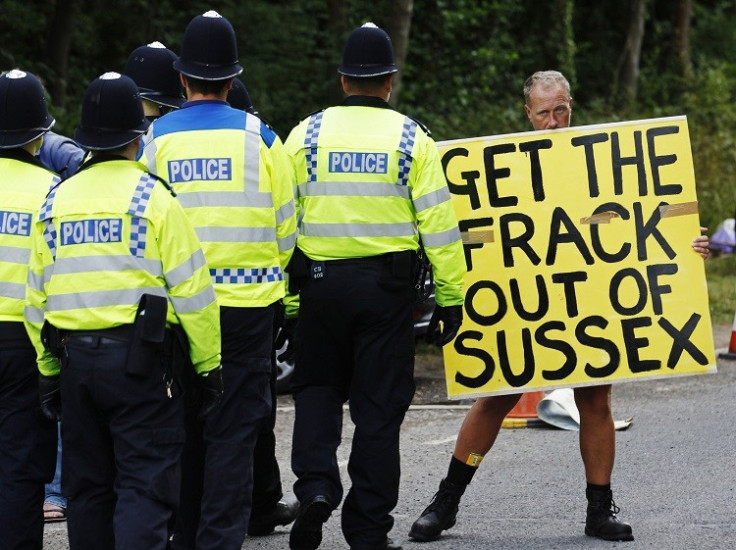Cuadrilla Scales Back Balcombe Shale Gas Drilling as Anti-Fracking Protesters Descend on Sussex

Cuadrilla Resources is scaling back its exploratory drilling work at the Balcombe site in Sussex after police warnings of potential civil disobedience ahead of several days' protesting by a thousand anti-fracking campaigners.
Balcombe will see protesters descend on the sleepy Sussex village for the No Dash for Gas event, a four day long camp against Cuadrilla's drilling in the area, as the firm attempts to ascertain if the shale gas trapped in the rock below can be extracted at commercial levels.
If Cuadrilla's exploration is successful then this could lead to the controversial fracking process - using hydraulics to fracture shale rock and release the gas - being used at the site, though the energy firm has said this is "unlikely".
"After taking advice from Sussex Police, Cuadrilla is scaling back operations ahead of this weekend's No Dash for Gas event," said a Cuadrilla statement.
"During this time, our main concern is the safety of our staff, Balcombe's residents and the protesters following threats of direct action against the exploration site.
"We will resume full operations as soon as it is safe to do so."
The Environmental Campaign
Environmental campaigners say there is a risk that chemicals used in the fracking process could leak into the water supply and contaminate it, but the industry says all proper procedures, risk assessments and regulations are in place to make this event extremely unlikely.
Critics also say that the focus on shale gas in Britain, a fossil fuel, is a distraction from the country's climate change obligations and the government should instead focus primarily on renewables, such as wind power.
"We are excited to be here in Balcombe to stand in solidarity with the local community in opposing dirty fossil fuel extraction," said Ewa Jasiewicz of the No Dash For Gas campaign ahead of the four day protest camp in Sussex.
"The camp aims to be fully accessible and safe space where locals and guests alike will feel welcome. We will leave the site as we found it."
Sussex Police said they are working with the protest's organisers and the local community to ensure the event is peaceful and causes minimal disruption.
"We have been contacted by one organiser and this is important as there are many aspects that need to be considered, not least arrangements for fresh water and sanitary arrangements at their chosen camp site," said Sussex Police Superintendent Lawrence Hobbs.
"However it is not clear if all of the protesters are currently represented and it is essential that wherever they may be planning to camp, there is easy and unobstructed access to get to anyone who may be in need of the emergency services.
"We are acutely aware of the impact that this is having on the residents of Balcombe and back their call to protesters not to engage in any criminal activity in the pursuit of their aims.
"Indeed, our engagement with Balcombe people who are protesting at the site and the vast majority of those who have travelled from further afield has been mutually rewarding and we have been able to facilitate their right to assemble and protest."
Cuadrilla started exploratory drilling at Balcombe in early August. It installed a 3,000ft vertical well.
At the end of July, 18 anti-fracking protestors were held by police at the site after taking direct action. Some were trying to block Cuadrilla's vehicles by sitting in the middle of the road leading to the site.
UK's shale gas potential
A British Geological Survey (BGS) said there is as much as 1.3 trillion cubic feet of shale gas lying under Yorkshire and Lancashire alone.
If it can be commercially extracted, it will give the UK increased energy security as there will be much less reliant on foreign imports to maintain supply.
However, the energy industry has already warned that this will not necessarily lead to lower bills for consumers as the gas will still be affected by the global wholesale price.
As it stands, planning responsibility for shale gas extraction projects lies with local councils, but if the potential can be realised then it is likely that the government would officially designate such projects as nationally significant - meaning ministers will take over planning permission powers from local authorities.
The government fears progress on drilling work may be held up by a drawn-out planning process as local authorities look to use their powers to delay or block work from taking place in their areas.
In a bid to appease concerned local communities, the government announced a support package for those living close to shale gas extraction sites.
Every affected community will get £100,000 and 1% of revenues from the gas that is successfully extracted. Firms must also sign up to a community engagement charter to ensure locals are continuously consulted about any work planned.
© Copyright IBTimes 2025. All rights reserved.






















